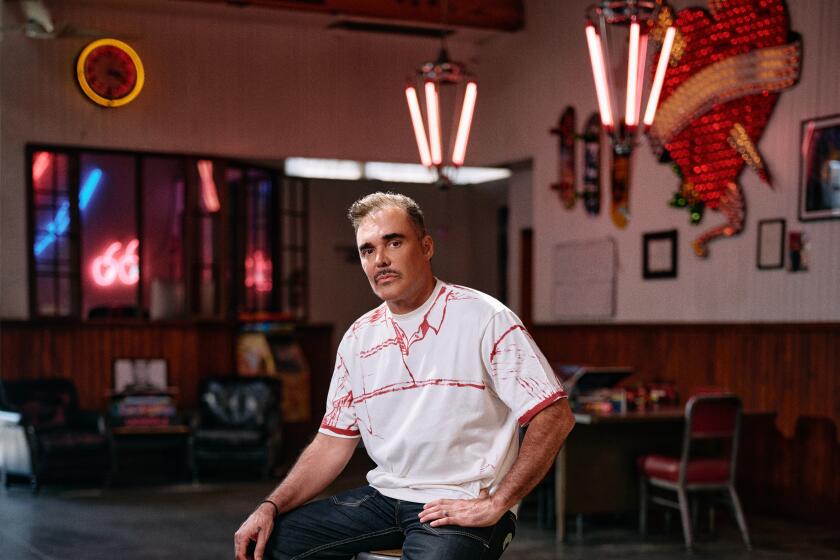Riding high, but so what?
THAT hearty voice and halting cadence. That expansive knowledge of anything and everything, that unquenchable curiosity and voracious attitude toward living and loving, even at age 74.
Spend a little time with William Shatner and some of the things that mean the most in his world -- his pretty wife, Elizabeth, and his world champion American saddlebreds and quarter horses -- and you can’t help take stock of the things that matter most, especially in this post-Sept. 11, post-Hurricane Katrina world.
For the record:
12:00 a.m. Sept. 25, 2005 For The Record
Los Angeles Times Tuesday September 20, 2005 Home Edition Main News Part A Page 2 National Desk 0 inches; 26 words Type of Material: Correction
Shatner’s novel -- An article about actor William Shatner in Sunday’s Calendar section said the name of his first novel was “TrekWar.” The title is “TekWar.”
For The Record
Los Angeles Times Sunday September 25, 2005 Home Edition Sunday Calendar Part E Page 2 Calendar Desk 0 inches; 26 words Type of Material: Correction
Shatner’s novel -- An article about actor William Shatner last Sunday incorrectly said the name of his first novel was “TrekWar.” The correct title was “TekWar.”
“Love,” Shatner says over two shrimp cocktails at one of his favorite Moorpark hangouts, Chuy’s. “What else is there?”
What else, indeed, could sustain this Canadian actor through his roller coaster acclaim and disdain, respect and ridicule -- from his storied success as Capt. James T. Kirk on “Star Trek” and now Denny Crane on “Boston Legal” to the bomb that was his first album, “The Transformed Man,” in 1968 to his first novel, “TrekWar,” and the multimedia franchise it launched, and the ups and downs of four marriages, including the suicide of his third wife in 1999?
“The older you get the more you need love because the more you see that life is not very long,” adds Shatner. The words do not flow from an aging man overwrought with sentimentality. The robust father of three and grandfather of five is not on a soapbox either. He is at ease and not at all fazed by the electric speed of his life. Consider just the last two years as an example.
His Emmy-winning guest role on “The Practice” in 2004 landed him a plum job opposite James Spader on its ABC spinoff, “Boston Legal,” and another Emmy nomination this year for supporting actor in a drama for his portrayal of a lawyer who manages to be sane and insane in the same breath. Earlier this year, Shatner took home a Golden Globe in the same category, two months after his second album, “Has Been,” an autobiographical collection produced by alternative artist Ben Folds, was received well by the public and the critics. He is now working on a documentary-style reality show for TV Land based on the album and did voice work on two upcoming animated features.
“People who say that life ends at 70 are 69,” Shatner says and cracks up at his own line. “If you have your health, there’s no reason why it shouldn’t go on. Within the normal limits of your ability to do things: Run. Walk. Make love. Talk. Think. Breathe. You can continue to the full extent of your ability, which in some cases, increases all the time. What you might lose you make up for with tenacity or cunning or more finesse.”
Herein are some of Shatner’s so-called normal limits: He kayaks alone in the Pacific Ocean, he hunts grizzly bears, he rides his motorcycle on L.A. freeways, he scuba dives, he flies airplanes, races cars and breeds horses for competition and rides them himself.
“He’s almost like a hyperactive little kid,” says Candice Bergen, Shatner’s costar on “Boston Legal.” “To someone who doesn’t know him until just recently, it seems this is one of the richest times in his life.”
Shatner agrees. Just don’t call it a renaissance or a rebirth. After all, his legacy in television cuts across decades: from “Howdy Doody” to “The Twilight Zone,” “Star Trek” and “T.J. Hooker” to “Rescue 911” and “Boston Legal,” for which creator David E. Kelley fashioned a character he hoped Shatner would want to play. And don’t forget his funky Priceline commercials.
“Where did I go?” he says matter-of-factly. “I didn’t go anywhere. I was right here. To the best of my recollection, I’ve been working all the time. It’s just that people are more interested in the flavor of the month or year, but I’ve done a lot of stuff. And suddenly I’m in the forefront for a while, and then that will disappear. But I’ll still be working.”
On the set of “Boston Legal,” where production on the second season, which premieres Sept. 27, was underway last month, Shatner cherishes the complexities of playing an ultraconservative, pompous lawyer who makes viewers laugh with him and at him. It is Denny Crane’s ruling dynamic and a characteristic that Kelley worried Shatner might not want to explore on-screen.
“Denny Crane was an icon who was past his time and who still traded on the currency of his legendary status as a powerful and prolific litigator,” Kelley says. “And he is someone who is perhaps losing it a bit mentally. The trick was I never wanted the audience to be sure whether Denny Crane knew exactly what he was saying or not.”
To that end, viewers have been teased with the possibility that Crane is suffering from the beginning stages of Alzheimer’s. Or maybe he is a practical joker. Or maybe the joke is on us, and Crane -- like the actor who portrays him -- is only toying with us and doesn’t really believe he is the center of the universe. The swagger, the parodied speech patterns, the larger-than-life persona: Is it all make-believe? Is Shatner playing Crane, or is Crane really Shatner?
“Even though Bill has had incredible success throughout his career, I think, whether he realizes it or not, he took his image -- people felt he took himself too seriously -- and completely ran with it and was brilliant at making fun of it and making fun of himself and showing people what a great sense of humor he has about himself,” Bergen says.
Unlike Shatner, who does not go around announcing his name -- he doesn’t have to -- his character invokes his moniker, “DennyCrane,” as a substitute for “hello,” “goodbye” and in lieu of anything compelling to say. It took a few rehearsals for Shatner to find his DennyCrane voice and rhythm.
“It’s like music, I did create a sound,” Shatner says. “It’s almost nonverbal communication. In his mouth, he’s expressing an emotion by saying his name, which is a funny concept.”
Pushing the envelope
THIS season promises to be a doozy for Crane, who will march into court in one episode dressed as a minuteman to make a point about gun control. In another, he shoots a child murderer and rapist in the kneecaps to get out of defending him.
In this way at least, Shatner completely relates to his character.
“Sometimes you’ve got to be able to push the envelope about you,” Shatner says. “You have to be able to push it to a dangerous edge where you’re in danger of being stupid, silly, laughable, but short of that lies an area of real attraction where people are wondering what you’re going to do. It’s a high-wire act and you’re balancing on nuance.”
Those shades of gray are also a trademark of Spader’s Emmy-winning performance in “The Practice” (he too is up for an award for “Boston Legal” in tonight’s ceremony). Together, Shatner and Spader have turned the show’s balcony scenes, where they have nightcaps and smoke cigars, into a weekly highlight.
“Crane was the one that not only hired Alan Shore [Spader] but was the reason Shore was OK to coming into this law firm, a law firm that probably wasn’t commiserate with Shore’s values or predilections,” Kelley says. “But to the extent that the relationship evolved, that’s a credit to James and Bill. You can’t orchestrate chemistry. It’s never lost on me that there’s a little piece of magic in those two characters.”
Bergen takes it a little further: “For the people who watch the show, they are the favorite couple. They are sort of America’s sweethearts.”
Spader hears this and laughs: “All I know is that these two very different people are thrown together and almost in a perfect mirror reflection of the characters we play on the show, there is an unconditional caring for one another. Alan and Denny don’t know each other’s lives particularly well, and neither do we. They have no expectations and no preconceptions; they allow themselves to be pleasantly surprised.”
“Boston Legal” has so changed Shatner’s life that he named a 4-year-old American saddlebred he and his wife purchased last year after the show. The day after young Boston Legal won his first world championship in Kentucky, his proud owner beamed and said he is advertising him as “No. 1 on the ground. No. 1 on the air.”
“This is a tough world, and it’s a world where there are younger, better people than I,” Shatner says, sitting on a horse he calls Date at the Girardi Quarter Horses stables in Moorpark. “To accomplish something significant in the horse world is just as tough as to accomplish something significant in the acting world. Horses need the three things that actors need: looks, talent and they need the mind.”
But, Shatner, the man, never loses sight of what he most needs.
“Until the very end, there’s potential for something: for good, for improvement, for joy, for laughter. The finality of saying that love is everything is not exactly a new thought. But it’s not a new thought because it’s the truth. If someone loves you and you love someone, that’s all there is. Everything else is an accouterment.”
More to Read
Sign up for our Book Club newsletter
Get the latest news, events and more from the Los Angeles Times Book Club, and help us get L.A. reading and talking.
You may occasionally receive promotional content from the Los Angeles Times.









